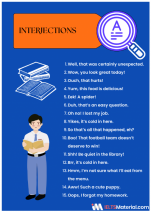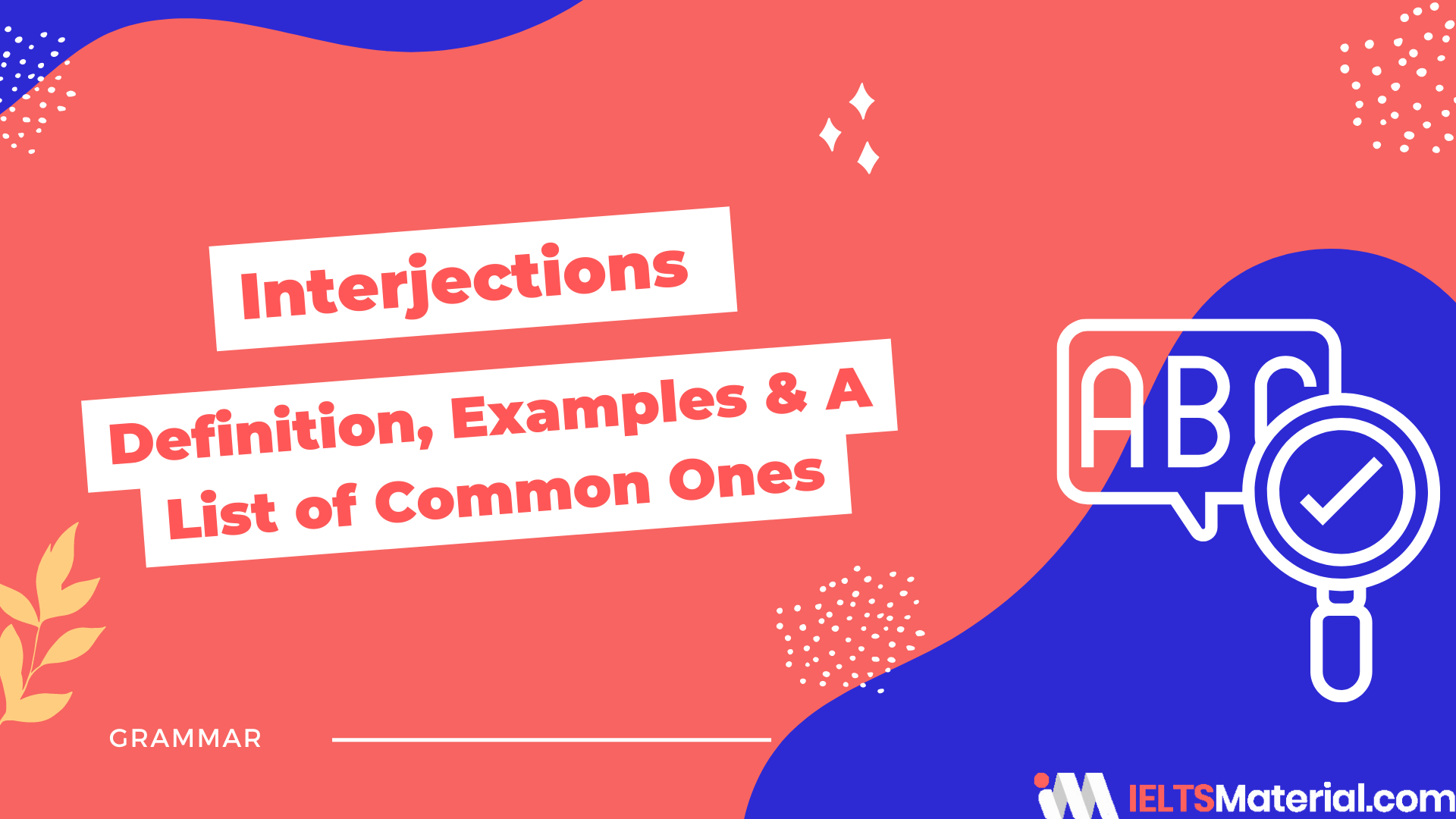Exploring Interjections: Definition, Types, and Examples
7 min read
Updated On
-
Copy link
Table of Contents

Limited-Time Offer : Access a FREE 10-Day IELTS Study Plan!
In the vast realm of language, interjections serve as powerful tools for expressing emotions, adding emphasis, or capturing attention. They are short and spontaneous utterances that can convey various feelings, such as joy, surprise, pain, or frustration.
In this article, let us clear our doubts and revise the definition of interjection with examples.
What is an Interjection?
An interjection is a part of speech that functions independently, often inserted into a sentence or dialogue to express strong emotions or abrupt exclamations.
Unlike other parts of speech, interjections do not contribute to the grammatical structure of a sentence. Instead, they convey the speaker’s feelings or attitudes, often adding flavor and impact to the overall message.
Examples of Interjection
Now, let’s examine some interjection examples.
- Imagine a scenario where someone receives an unexpected gift and exclaims, “Wow! This is amazing!” In this case, “Wow” serves as an interjection, expressing astonishment and delight.
- If someone accidentally stubs their toe, they might cry out, “Ouch! That hurt!” Here, “Ouch” acts as an interjection, conveying pain and surprise.

Types of Interjections
Interjections in English grammar are an interesting and unique part of speech. Interjections are often used to convey feelings and reactions, making conversations more colorful and expressive.
Let’s explore some common types of interjections:
Primary Interjections:
Primary interjections are standalone words or phrases that express strong emotions or reactions. They are the most basic and commonly used interjections.
Examples:
- Wow! That’s incredible!
- Oops! I dropped my phone.
Secondary Interjections:
Secondary interjections are derived from other words and often serve as interjections within specific contexts. They are formed by adding extra sounds or altering existing words.
Examples:
- Yikes! That was a close call.
- Aha! I finally figured it out.
Volitive Interjections:
Volitive interjections express a speaker’s desire or command. They are used to convey wishes, hopes, or instructions.
Examples:
- Please! Can you help me with this?
- Let’s go! Time is running out.
Emotive Interjections:
Emotive interjections are used to convey strong emotions or feelings. They are employed to express happiness, surprise, sadness, or other intense emotions.
Examples:
- Hooray! I got the job!
- Alas! We missed the last train.
Cognitive Interjections:
Cognitive interjections are used to express thoughts, doubts, or uncertainties. They convey a sense of contemplation or intellectual engagement.
Examples:
- Hmm… I’m not sure about that.
- Well, let me think for a moment.
Greetings and Parting Words/Phrases:
Greetings and parting interjections are used to initiate or conclude conversations. They help establish a friendly tone or bid farewell to someone.
Examples:
- Hello! How are you doing?
- Goodbye! See you later.
The different types of interjections discussed above showcase the range of emotions, intentions, and functions that interjections serve in communication. By incorporating them into our speech and writing, we can effectively convey our feelings, engage others, and add depth to our conversation.
Frequently Used Interjections
Now, let’s move on to our primary focus: the list of interjections commonly used. Familiarizing yourself with these interjections will help you understand emotions more effectively and be more expressive in various situations.
Here is a comprehensive interjection list:
| Interjection | Meaning |
| Ouch
Yay Oops Alas Hooray Ugh Bravo Phew Eww Huh Haha Oh no Yikes Well |
expressing pain
expressing joy or excitement expressing mild mistake or accident expressing sadness or regret expressing celebration or happiness expressing frustration or annoyance expressing admiration or approval expressing relief or exhaustion expressing disgust or aversion expressing confusion or curiosity expressing laughter or amusement expressing alarm or concern expressing fear or surprise expressing hesitation or thoughtfulness |
These are just a few interjection examples from the extensive array. Each interjection word carries its own unique connotation and emotional resonance, making them invaluable in effective communication.
Moreover, interjections can be spoken or written and you need to know when to use interjections, with the latter often accompanied by punctuation marks such as exclamation points.
Hey! Are you interested in enriching your grammatical knowledge?
Check out our Grammar book with detailed explanations and loads of exercises!
Significance of Interjections in Sentences
Interjections, often referred to as the “spice” of language, play a unique and vital role in sentences. These expressive words or phrases add emotional depth, tone, and authenticity to our communication. Here, we explore the significance of interjections in sentences:
- Expressing Emotion: Interjections are the go-to linguistic tool when it comes to expressing emotions. They provide an immediate and unfiltered outlet for feelings like surprise, joy, anger, frustration, or even confusion. For example, “Wow, that’s amazing!” or “Oh no, I forgot my keys!”
- Adding Realism: In everyday conversations and written dialogues, interjections mirror real-life interactions. They make characters in literature or speakers in conversations sound more authentic. A story without interjections might feel flat and less relatable.
- Conveying Intensity: Interjections intensify the impact of a sentence. When you exclaim “Fantastic!” instead of just saying “That’s great,” you seem more enthusiastic than usual. They allow you to emphasize your emotions.
- Creating Atmosphere: In creative writing, interjections are used to set the mood or atmosphere. A character who frequently uses interjections like “Oh dear” or “Alas” may evoke a sense of melodrama, while “Aha!” can imply a sudden revelation.
- Enhancing Dialogue: Interjections help shape character personalities and relationships in dialogue. A character who often uses “Uh-huh” might be seen as agreeable or passive, while someone saying “No way!” could be the skeptic.
Rules for Using Interjections
While interjections can add depth and emotion to your speech and writing, it’s important to use them judiciously to maintain clarity and professionalism. Here are some rules for when you can and cannot use interjections:
When You Can Use Interjections:
Casual Conversations
Interjections are perfectly acceptable in casual conversations with friends, family, or close acquaintances. They help convey your emotions and enthusiasm effectively.
Example: “Wow, that movie was amazing!”
Informal Writing
In informal writing, such as personal emails, text messages, or social media posts, interjections can add a personal touch and make your communication more engaging.
Example: “OMG, I can’t believe I won my dream car in the jackpot!”
Creative Writing
In creative writing, including fiction, poetry, and storytelling, interjections can be used to emphasize characters’ emotions and reactions, creating a vivid and immersive experience for readers.
Example: “Oh, the astounding scenic beauty of Kedarnath left us speechless.”
Expressing Surprise or Excitement
Interjections are commonly used to express surprise, excitement, or awe.
Example: “Whoa, that magic trick was incredible!”
When You Cannot Use Interjections:
Formal Writing
In formal writing, such as academic papers, business reports, or professional correspondence, interjections should be avoided. They can undermine the seriousness and professionalism of your writing.
Incorrect Example: “OMG, the quarterly financial report is due tomorrow.”
Corrected: “The quarterly financial report is due tomorrow.”
Professional Speech
In formal presentations, job interviews, or other professional settings, interjections should be minimized or omitted altogether. Maintain a composed and respectful tone.
Incorrect Example: “Well, um, I believe our sales numbers, like, totally increased.”
Corrected: “I believe our sales numbers increased.”
Overuse
Even in informal contexts, excessive use of interjections can be distracting and make your communication less effective. Use them sparingly to maintain clarity and coherence.
Incorrect Example: “Oh my goodness, I just saw the cutest, like, puppy ever, and I was like, ‘Awwww!'”
Corrected: “I just saw the cutest puppy ever and said, ‘Aww!'”
Misplaced Emphasis
Avoid using interjections in a way that misrepresents your true emotions or reactions. Ensure they match the context and your intended message.
Incorrect Example: “I’m so excited to see you. Meh, it’s been a while.”
Corrected: “I’m excited to see you. It’s been a while.”
Conclusion
Interjections play a significant role in language, enabling us to express emotions and grab attention. Whether it’s the thrill of a surprise or the sting of pain, interjections allow us to convey our feelings with immediacy and impact.
By understanding and utilizing a wide range of interjections in Grammar, we can enrich our communication skills and effectively express our emotions. So go ahead, embrace the power of interjections, and infuse your conversations with passion, enthusiasm, and authenticity.
Intrigued to delve further into the world of IELTS prep? Uncover valuable insights, tips, and resources on our website that can help you navigate the IELTS journey.
FAQs
1. Do interjections have grammatical rules?
Unlike other parts of speech, interjections have minimal grammatical rules. They are often standalone words or phrases that do not require a subject or verb.
2. Can interjections be found in written language?
Yes, interjections can be found in written language, especially in informal writing, dialogues, or creative works. They add emotion and authenticity to the text.
3. What’s the purpose of using interjections?
Interjections add emotional depth and emphasis to language. They help convey the speaker’s feelings or reactions more vividly.
4. Are interjections always followed by an exclamation mark?
While many interjections end with an exclamation mark to show strong emotion, not all interjections require one. Some may be followed by a period or question mark depending on the context.
5. Can interjections be used in formal writing?
In formal writing, interjections are generally avoided. However, they can be used sparingly in creative or literary pieces to achieve a specific effect.
Also, check:

Start Preparing for IELTS: Get Your 10-Day Study Plan Today!
Recent Articles

Nehasri Ravishenbagam

Prity Mallick

Kasturika Samanta





Post your Comments